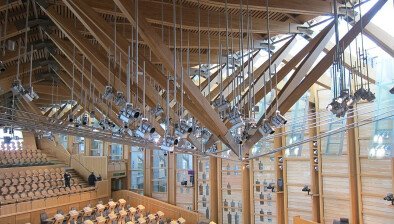Scottish Government admits 2030 climate change target is ‘out of reach’

The Scottish Government has dropped its flagship target of reducing greenhouse gas emissions by 75% by 2030 after accepting that the interim step is now “out of reach”.
Net zero minister Màiri McAllan told the Scottish Parliament yesterday that an “unwavering commitment” to achieve net zero by 2045 will remain but that the country must ensure the progress is “at a pace and scale that is feasible, fair and just”.
The news follows a report from the Climate Change Committee (CCC) last month which concluded that Scotland has no comprehensive strategy to decarbonise towards net zero and will miss its statutory 2030 goal to reduce emissions by 75%.
Responding to the CCC progress report, Ms McAllan unveiled a new package of climate action measures, including increasing the number of electric vehicle chargers, and land use.
The increase in charging points comes as part of a wider climate package that also includes an integrated ticketing system which can be used across all public transport. In agriculture and land use, a new carbon tax on large estates to incentivise peatland restoration, tree planting and renewable energy generation will be consulted on, and ways to reduce emissions from livestock through the use of special feedstuffs will be piloted.
In her statement to MSPs, Ms McAllan said: “The race to net zero is one that we must all win and I want to begin by affirming this Government’s unwavering commitment to ending our contribution to global emissions by 2045 at the latest, as agreed by Parliament on a cross-party basis.
“I was grateful for the latest report from the Climate Change Committee on our progress in reducing emissions. The CCC are a key partner in our net zero journey and their insights are essential.
“Their report recognised much to be proud of, including this Government’s provision of free bus travel to all under 22s, our work delivering more woodland in Scotland in a year than any other UK nations combined and our work on decarbonising Heat in Buildings, noting that it could become a template for the rest of the UK.
“Considerable progress is also being made in energy. Scotland is becoming a renewables powerhouse - with 87.9% electricity generation coming from zero or low carbon sources in 2022.
“These are just some of the examples of the considerable work that has been taken and which sees us nearly halfway to net zero, narrowly missing our most recent annual emission reduction target, but decarbonising faster than the UK average.
“But rightly, just as with the UK Government, the CCC challenges us to go further. And that is exactly what we will do as today, I have announced a new package of climate action measures, which we will deliver with partners to support Scotland’s transition to net zero.”
Minister for zero carbon buildings, active travel and tenants’ rights Patrick Harvie, said: “The package of new climate measures announced today is absolutely critical, to ensure that Scotland gets back on track and can meet net zero, becoming one of the first countries in the world to end our contribution to climate change in a just and fair way.
“Only by working together across the political divide and with all levels of government, the public sector and the business community can we tackle the climate crisis with the pace and urgency required.
“We are making progress towards our goal of net zero by 2045 – as demonstrated by our recent consultation on proposals for a Heat in Buildings Bill which the Climate Change Committee described as a potential template for the rest of the UK.
“We will now carry on working with stakeholders and communities to ensure progress is delivered fairly and in the right way, recognising the different needs of rural, island and urban areas.”
Following the statement, Ashley Campbell, policy and practice manager at CIH Scotland, expressed her disappointment in the loss of the interim target and highlighted the lack of housing support in the list of new measures.
Ms Campbell said: “It’s disappointing to hear that the Scottish Government has decided to drop the interim net-zero target which would have seen carbon emissions cut by 75% by 2030. The recent report from the Climate Change Committee clearly showed that Scotland was not on track to meet the 2030 target, and this makes it even more important for the Scottish Government to take decisive action to ensure we can still meet net zero by 2045.
“Action to support the housing sector was a notable omission from today’s statement, however it remains essential that the Scottish Government sets a clear direction for energy efficiency and decarbonisation across tenures through the Heat in Buildings Bill. We also need to see stronger financial commitment from the Scottish Government to ensure that social and private landlords, and homeowners can make the investment needed in homes across Scotland without increasing the risk of poverty. This also needs to be underpinned with accessible advice, information, and support to ensure that people can make informed decisions about upgrading their homes.
“It may be too late to meet the 2030 target, but we must not lose sight of the target to meet net zero by 2045.”
Homes for Scotland said the announcement reflects long-standing home building sector concerns on the viability of original timescales in relation to the transition to net zero and called on the Scottish Government to pause and review the viability of net zero legislation from a housing delivery perspective.
Jane Wood, chief executive, said: “The home building sector has been clear and consistent in its recognition of and support for the need to do more at the earliest practicable opportunity to reduce greenhouse gas emissions associated with the construction and operation of new build homes but has long-standing concerns regarding the viability of legislation being brought forward to achieve this and lack of a clear and co-ordinated delivery route map.
“With four local authorities already declaring housing emergencies, an accumulated shortfall of over 100,000 homes since 2008 and recent research showing that over a quarter of households are facing some form of housing need, it is imperative that all future regulation and policy is considered in this context.
“Given the current economic conditions and regulatory challenges our home builder members who operate across all tenures face, this transition, much like the overarching ambition to reduce emissions by 75% by 2030, is unachievable under current timescales.
“We therefore encourage the Scottish Government to pause and review any further regulation, such as their commitment to introduce a Passivhaus Equivalent Standard for new homes from 2025. and to work with us and other stakeholders to prepare a clear road map which would enable the sector to deliver low-carbon homes at scale and pace, ensuring that Scotland has the homes it requires to meet the needs of its people.”
Environmental charity Changeworks said Scotland’s future has been failed by the Scottish Government’s “negligence” and “reckless lack of proportionate action” that has seen annual emissions targets being missed eight times.
Changeworks chief executive, Josiah Lockhart, said: “We’re at this point because the government have failed to act. We’ve been thoroughly failed by those who promised strong leadership.
“Despite the government’s climate rhetoric, we are far behind where Scotland needs to be. Empty words got us to this point. We don’t want more promises. We don’t want more delay. We need meaningful leadership and action. This must include clear, consistent direction, and policies which meet the scale and pace of the worsening climate emergency.”
Changeworks added that it is reassured that the Heat in Buildings Bill has not been rolled back, and urged the government to now focus on passing this legislation as quickly as possible.
Josiah said: “The Heat in Buildings Bill in particular is a once in a generation chance to revolutionise the way our homes and buildings are built and retrofitted, leading to lower energy bills and alleviating fuel poverty.”
Claire Mack, chief executive of Scottish Renewables, said: “Scotland was the first country in the world to commit to achieving net-zero carbon emissions in line with scientific evidence and the first country in the world to declare a climate emergency.
“This has helped establish Scotland as a globally recognised leader on climate action which is why the rollback on our landmark 2030 target and wider climate change legislation is extremely disappointing.
“At this crucial time, we need to signal confidence to investors and our supply chain that Scotland is the best place in the world to build the renewable energy projects which deliver energy security, economic growth and carbon reduction at scale.
“The Scottish Government must learn the lessons of these missed targets by urgently acting on the clear recommendations of the Climate Change Committee and delivering the strong policies needed to support delivery.
“This will be essential to ensuring carbon emissions are reduced at the rate required across every sector and to maintain investor confidence in Scotland’s renewable energy industry.
“We urge the Scottish Government to work collaboratively with industry and key stakeholders to deliver the coherent policy environment needed to realise Scotland’s full potential as a net-zero powerhouse.”
Fiona Hodgson, chief executive of the Scottish and Northern Ireland Plumbing Employers’ Federation (SNIPEF), called for a comprehensive reset of policy, engagement, and targets.
Ms Hodgson said: “The 2030 targets, which always seemed more driven by the pursuit of headlines than establishing a meaningful, step-by-step roadmap towards the 2045 climate goals, were sadly and predictably abandoned due to their unrealistic ambitions and the lack of a realistic plan to support them.
“This approach has inevitably led to their failure and fostered uncertainty among businesses and the public about the feasibility of future targets.”
Moving forward, Ms Hodgson urges the government to pause and reset, adopting a more inclusive approach by incorporating all relevant stakeholders, including industry experts and community representatives, from the beginning of the planning process.
“To prevent further setbacks and foster an investment-friendly environment, the government must systematically overhaul the target-setting process,” she advised.
Ms Hodgson highlighted the need for future targets to be based on detailed, sector-specific knowledge that addresses practical realities, including the necessary infrastructure from power generation to consumption.
“These targets should not be arbitrary or merely top-down, reverse-engineered mandates but should be collaboratively developed, realistic, and achievable objectives with clear steps and milestones,” she added.
Dave Hawkey, senior research fellow at IPPR, warned that the government’s climate climb down risks the future of net zero.
He added: “This decision shows that laudable targets mean nothing if they’re not backed by credible policies to deliver. Scotland’s consistent failure to meet its climate targets reveals the gap between the Scottish Government’s words and the actions we need to reach net zero.
“For all the Scottish Government’s strategies and visions, tangible progress decarbonising the everyday economy - how we heat our homes, how we get around, and the food we eat - has been glacial.
“Today’s announcement must open a new chapter in Scottish climate policy, bringing the public into meaningful decision making. This is the only route to policies that command the widespread support needed to coordinate a just transition.”
Tania Kumar, net zero director at the CBI, said: “Delivering net zero isn’t just the right thing to do, it’s also an enormous economic opportunity for this country. Setting targets has been critical in providing the signals that businesses require to make investments in high growth net zero sectors like offshore wind.
“While targets alone are not enough in an internationally competitive market for investment, firms will want clarity on what comes next. That means any proposed new targets should be underpinned by robust policies that deliver clear direction for future emissions reduction.
“Research shows that the green economy is among the fastest growing sectors worldwide, and Scotland – with its energy capacity, legacy expertise and established supply chains – stands exceptionally well placed to benefit form those opportunities.”













